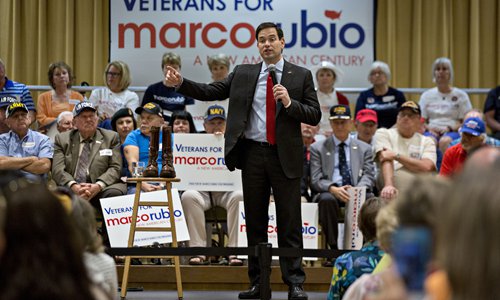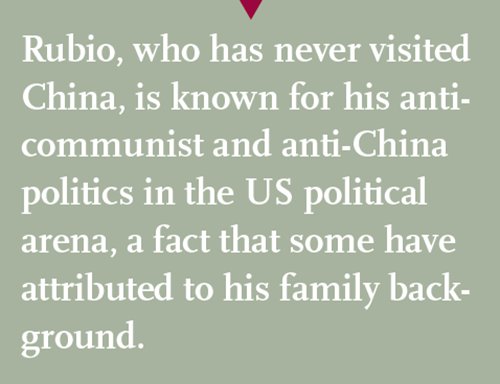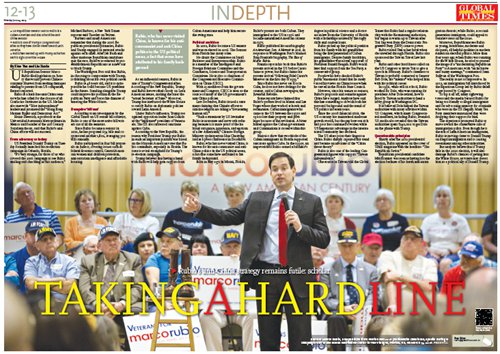HOME >> CHINA
Rubio’s anti-China strategy remains futile: scholar
By Xiao Yan and Liu Xuxia Source:Global Times Published: 2019/6/23 19:01:57
○ US Republican Senator Marco Rubio is a Cuban American and also a hard-line anti-China senator
○ Rubio is one of Trump's Congressional allies as they have similar views toward Latin America
○ Rubio has teamed up with Trump as he has set his sight on White House

Rubio is a hard-line anti-China senator who has called for the closure of all Confucius Institutes in the US. He has also met with "Tibet independence" leaders and promoted the "Hong Kong Human Rights and Democracy Act."
Heinz Dieterich, a professor at the Universidad Autónoma Metropolitana in Mexico and founder of the 21st Century Socialism theory, said that Rubio's anti-China efforts will not succeed.
From adversary to lackey
US President Donald Trump on Tuesday formally launched his re-election campaign in Orlando, Florida.
"It's very strange, for those of us who covered the 2016 campaign to see Rubio smiling and chuckling in this audience," Michael Barbaro, a New York Times reporter said Tuesday on Twitter.
Barbaro and many Americans remember that during the 2016 Republican presidential primaries, Rubio and Trump engaged in personal attacks against each other. After Jeb Bush and other moderate Republican candidates quit the race, Rubio was selected by pro-establishment Republicans as a new star to block Trump.
The Washington Post said that Rubio, in choosing to compromise with Trump, is thinking about his own political career.
Rubio is 48 years old, and it is quite possible he could become US president in the future. Standing alongside Trump could improve his position in the Republican Party and boost his chances of entering the White House.
Deceptive 'bill nut'
According to an investigation by the Global Times on US senate bill statistics, Rubio is one of the most active bill writers out of all the senators.
Since Rubio became a senator in 2010, he has proposed 654 bills and co-sponsored another 1,802, averaging 300 bills annually.
Rubio participated in four bill proposals on June 11, covering issues such as federal firearms control, Central American women and children protection, anti-terrorism intelligence and affordable housing.
As an influential senator, Rubio is one of Trump's Congressional allies. According to the New Republic, Trump and Rubio have worked closely on Latin American issues, making the latter the "actual Secretary of State." Moreover, Trump has instructed the White House to satisfy Rubio on diplomatic policies toward Latin America.
Under Rubio's influence, Trump recognized opposition leader Juan Guaido as the "legitimate" president of Venezuela. The US also increased sanctions against Cuba.
According to the New Republic, the reason why President Trump put Rubio in such an important position was based on the Hispanic American votes that Rubio commands, especially in Florida. The state is a vital stronghold for Trump's re-election campaign.
Trump believes that having a hand with Rubio will help gain support from Cuban Americans and help him secure the swing state.

Political ambition
In 2010, Rubio became a US senator and was re-elected in 2016. The Senator from Florida has many roles.
He chairs the Committee on Small Business and Entrepreneurship. Rubio is a member of the Intelligence and Foreign Relations Committee and the Commerce, Science and Transportation Committee. He is also co-chairman of the Congressional-Executive Commission on China (CECC).
With 23 members from the government and Congress, CECC is seen as the source of many of the US government's anti-China policies.
Last December, Rubio issued a statement claiming that China's efforts to sinicize religion are taking a "devastating human toll."
"Such a statement by US lawmaker Rubio is nonsense and not worth refuting because it is more proof of the habitual arrogance, ignorance, and egotism of a few Americans," Chinese Foreign Ministry spokesperson Hua Chunying said at a press conference in December.
Rubio, who has never visited China, is known for his anti-communist and anti-China politics in the US political arena, a fact that some have attributed to his family background.
Born in May 1971 in Miami, Florida, Rubio's parents are both Cuban. They immigrated to the US in 1956 and became naturalized American citizens in 1975.
Rubio published his autobiography An American Son: A Memoir in 2012, in response to Washington Post's Manuel Roig-Franzia's biography, The Rise of Marco Rubio.
Franzia says in his book that Rubio's parents arrived in the US before Castro came to power, but Rubio claims his parents arrived "following Fidel Castro's takeover on the first day of 1959."
Since Rubio has never set foot in Cuba, he does not have feelings for the country, said a Cuban newspaper, the Juventud Rebelde.
Some reports have claimed that Rubio's parents lived in Miami and Las Vegas where they worked at hotels and restaurants. Cuban immigrants who came to the US between the 1950s and 1960s lost their property and privileges because of the revolution. A bitter hatred against the Cuban government and Communism is rooted within this group.
Statistics show that two-thirds of the Cuban immigrants in Florida supported sanctions against Cuba. In the 1990s, an impoverished Rubio earned a bachelor's degree in political science and a doctorate in law from the University of Florida with scholarships assisted by his rugby skills and student loans.
Rubio picked up his political position from his family with his grandfather being the first generation of Cuban immigrants. Despite family hardships, his grandfather was a loyal supporter of President Ronald Reagan. Rubio would later find support from the Tea Party, a conservative group.
People who have checked Rubio's public statements found that he rarely voiced his views on China issues when he served in the Florida State Council.
However, since his tenure as senator, Rubio's proposals and remarks against China have surged. Analysts have said this has something to do with both his personal background and the trend of US politics in recent years.
Since the 2008 financial crisis, the US economy has maintained moderate growth overall, but the gap between rich and poor has continued to widen while US hegemonic advantage in the international community has declined.
The US elites point their fingers at China. Rubio sharply captured this trend and became an advocate of the "China threat theory."
Rubio is also one of the leading Congressional figures who support "Taiwan independence."
One source in Taiwan told the Global Times that Rubio had a regular relationship with the Kuomintang authorities, but began to warm up to Taiwan after Tsai Ing-wen from the Democratic Progressive Party (DPP) came to power.
Rubio visited Tsai at her hotel when she travelled through Florida. Rubio also sponsored the Taiwan Travel Law last year.
Rubio and other hard-liners called on the US Congress to invite Tsai to give a speech in February. Rubio's closeness to Taiwan is probably connected to Senator Bob Dole, his "mentor" who helped him with his political career.
In 1996, while still in school, Rubio worked for Dole, who was running for president. After Dole retired, he was hired by Taiwan authorities to head a lobby group in Washington DC.
It is believed Dole helped the Taiwan authorities with many activities within US Congress, which many Congressional members, including Rubio, attended. US media also revealed that the Taiwan authorities spent $140,000 to get Dole on the phone with Trump.
Questionable principles
Shortly after the 2012 presidential election, Rubio appeared on the cover of TIME magazine with the headline: "The Republican Savior."
Republican presidential candidate Mitt Romney was seen as having lost the election because of his harsh anti-immigration rhetoric, while Rubio, a second-generation immigrant, could appeal to centrist voters on the issue.
Moreover, Republicans see Rubio as young, handsome, moderate and eloquent, all helpful qualities in modern American electoral politics. More than four years ago, when Rubio was running for the White House, he tried to present the image of a "modernizing Republican Party" to Americans, with "an inclusive and sunny message," commented Sean Sullivan of the Washington Post.
The reality is not so impressive. In 2012, an immigration bill introduced by the Bipartisan Group led by Rubio failed to get passed by Congress.
To top it all off, many right-wing voters and the media berated Rubio for being too friendly to illegal immigrants and for advocating amnesty for criminals who were in the US illegally. Many Tea Party members announced they were dropping their support for him.
The experience prompted Rubio to move toward the conservative side of immigration policy. Even though he is the son of Latin American immigrants, Rubio is moving closer to Donald Trump on illegal immigration and is causing resentment among other minorities.
But analysts believe that if Trump fails in the 2020 election, it will also damage Rubio's chances of getting into the White House, as voters may desert him as a political ally of Donald Trump.

Newspaper headline: Takingahardline
○ Rubio is one of Trump's Congressional allies as they have similar views toward Latin America
○ Rubio has teamed up with Trump as he has set his sight on White House

Senator Marco Rubio, a Republican from Florida and 2016 presidential candidate, speaks during a campaign rally at the Rohan Recreation Center in The Villages, Florida, US, on March 13, 2016. Photo:VCG
US Republican Senator Marco Rubio filed legislation on June 17 that would prevent Chinese company Huawei from seeking damages relating to patents from US companies, Reuters reported.Rubio is a hard-line anti-China senator who has called for the closure of all Confucius Institutes in the US. He has also met with "Tibet independence" leaders and promoted the "Hong Kong Human Rights and Democracy Act."
Heinz Dieterich, a professor at the Universidad Autónoma Metropolitana in Mexico and founder of the 21st Century Socialism theory, said that Rubio's anti-China efforts will not succeed.
From adversary to lackey
US President Donald Trump on Tuesday formally launched his re-election campaign in Orlando, Florida.
"It's very strange, for those of us who covered the 2016 campaign to see Rubio smiling and chuckling in this audience," Michael Barbaro, a New York Times reporter said Tuesday on Twitter.
Barbaro and many Americans remember that during the 2016 Republican presidential primaries, Rubio and Trump engaged in personal attacks against each other. After Jeb Bush and other moderate Republican candidates quit the race, Rubio was selected by pro-establishment Republicans as a new star to block Trump.
The Washington Post said that Rubio, in choosing to compromise with Trump, is thinking about his own political career.
Rubio is 48 years old, and it is quite possible he could become US president in the future. Standing alongside Trump could improve his position in the Republican Party and boost his chances of entering the White House.
Deceptive 'bill nut'
According to an investigation by the Global Times on US senate bill statistics, Rubio is one of the most active bill writers out of all the senators.
Since Rubio became a senator in 2010, he has proposed 654 bills and co-sponsored another 1,802, averaging 300 bills annually.
Rubio participated in four bill proposals on June 11, covering issues such as federal firearms control, Central American women and children protection, anti-terrorism intelligence and affordable housing.
As an influential senator, Rubio is one of Trump's Congressional allies. According to the New Republic, Trump and Rubio have worked closely on Latin American issues, making the latter the "actual Secretary of State." Moreover, Trump has instructed the White House to satisfy Rubio on diplomatic policies toward Latin America.
Under Rubio's influence, Trump recognized opposition leader Juan Guaido as the "legitimate" president of Venezuela. The US also increased sanctions against Cuba.
According to the New Republic, the reason why President Trump put Rubio in such an important position was based on the Hispanic American votes that Rubio commands, especially in Florida. The state is a vital stronghold for Trump's re-election campaign.
Trump believes that having a hand with Rubio will help gain support from Cuban Americans and help him secure the swing state.

Political ambition
In 2010, Rubio became a US senator and was re-elected in 2016. The Senator from Florida has many roles.
He chairs the Committee on Small Business and Entrepreneurship. Rubio is a member of the Intelligence and Foreign Relations Committee and the Commerce, Science and Transportation Committee. He is also co-chairman of the Congressional-Executive Commission on China (CECC).
With 23 members from the government and Congress, CECC is seen as the source of many of the US government's anti-China policies.
Last December, Rubio issued a statement claiming that China's efforts to sinicize religion are taking a "devastating human toll."
"Such a statement by US lawmaker Rubio is nonsense and not worth refuting because it is more proof of the habitual arrogance, ignorance, and egotism of a few Americans," Chinese Foreign Ministry spokesperson Hua Chunying said at a press conference in December.
Rubio, who has never visited China, is known for his anti-communist and anti-China politics in the US political arena, a fact that some have attributed to his family background.
Born in May 1971 in Miami, Florida, Rubio's parents are both Cuban. They immigrated to the US in 1956 and became naturalized American citizens in 1975.
Rubio published his autobiography An American Son: A Memoir in 2012, in response to Washington Post's Manuel Roig-Franzia's biography, The Rise of Marco Rubio.
Franzia says in his book that Rubio's parents arrived in the US before Castro came to power, but Rubio claims his parents arrived "following Fidel Castro's takeover on the first day of 1959."
Since Rubio has never set foot in Cuba, he does not have feelings for the country, said a Cuban newspaper, the Juventud Rebelde.
Some reports have claimed that Rubio's parents lived in Miami and Las Vegas where they worked at hotels and restaurants. Cuban immigrants who came to the US between the 1950s and 1960s lost their property and privileges because of the revolution. A bitter hatred against the Cuban government and Communism is rooted within this group.
Statistics show that two-thirds of the Cuban immigrants in Florida supported sanctions against Cuba. In the 1990s, an impoverished Rubio earned a bachelor's degree in political science and a doctorate in law from the University of Florida with scholarships assisted by his rugby skills and student loans.
Rubio picked up his political position from his family with his grandfather being the first generation of Cuban immigrants. Despite family hardships, his grandfather was a loyal supporter of President Ronald Reagan. Rubio would later find support from the Tea Party, a conservative group.
People who have checked Rubio's public statements found that he rarely voiced his views on China issues when he served in the Florida State Council.
However, since his tenure as senator, Rubio's proposals and remarks against China have surged. Analysts have said this has something to do with both his personal background and the trend of US politics in recent years.
Since the 2008 financial crisis, the US economy has maintained moderate growth overall, but the gap between rich and poor has continued to widen while US hegemonic advantage in the international community has declined.
The US elites point their fingers at China. Rubio sharply captured this trend and became an advocate of the "China threat theory."
Rubio is also one of the leading Congressional figures who support "Taiwan independence."
One source in Taiwan told the Global Times that Rubio had a regular relationship with the Kuomintang authorities, but began to warm up to Taiwan after Tsai Ing-wen from the Democratic Progressive Party (DPP) came to power.
Rubio visited Tsai at her hotel when she travelled through Florida. Rubio also sponsored the Taiwan Travel Law last year.
Rubio and other hard-liners called on the US Congress to invite Tsai to give a speech in February. Rubio's closeness to Taiwan is probably connected to Senator Bob Dole, his "mentor" who helped him with his political career.
In 1996, while still in school, Rubio worked for Dole, who was running for president. After Dole retired, he was hired by Taiwan authorities to head a lobby group in Washington DC.
It is believed Dole helped the Taiwan authorities with many activities within US Congress, which many Congressional members, including Rubio, attended. US media also revealed that the Taiwan authorities spent $140,000 to get Dole on the phone with Trump.
Questionable principles
Shortly after the 2012 presidential election, Rubio appeared on the cover of TIME magazine with the headline: "The Republican Savior."
Republican presidential candidate Mitt Romney was seen as having lost the election because of his harsh anti-immigration rhetoric, while Rubio, a second-generation immigrant, could appeal to centrist voters on the issue.
Moreover, Republicans see Rubio as young, handsome, moderate and eloquent, all helpful qualities in modern American electoral politics. More than four years ago, when Rubio was running for the White House, he tried to present the image of a "modernizing Republican Party" to Americans, with "an inclusive and sunny message," commented Sean Sullivan of the Washington Post.
The reality is not so impressive. In 2012, an immigration bill introduced by the Bipartisan Group led by Rubio failed to get passed by Congress.
To top it all off, many right-wing voters and the media berated Rubio for being too friendly to illegal immigrants and for advocating amnesty for criminals who were in the US illegally. Many Tea Party members announced they were dropping their support for him.
The experience prompted Rubio to move toward the conservative side of immigration policy. Even though he is the son of Latin American immigrants, Rubio is moving closer to Donald Trump on illegal immigration and is causing resentment among other minorities.
But analysts believe that if Trump fails in the 2020 election, it will also damage Rubio's chances of getting into the White House, as voters may desert him as a political ally of Donald Trump.

Newspaper headline: Takingahardline
Posted in: IN-DEPTH